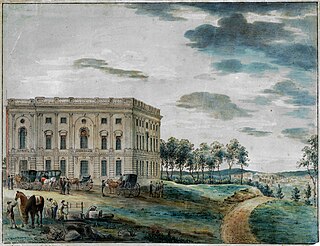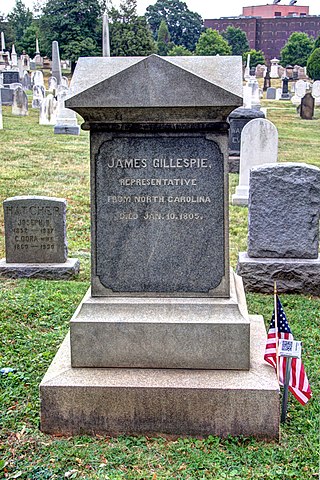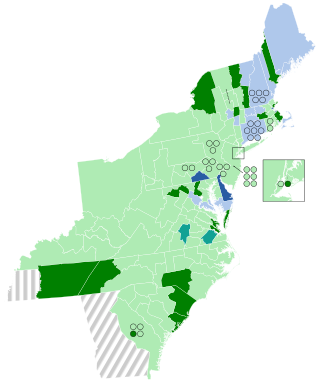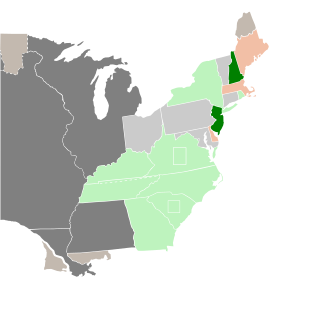Elections to the United States House of Representatives were held in North Carolina on August 10, 1804 for the 9th Congress.
Elections to the United States House of Representatives were held in North Carolina on August 10, 1804 for the 9th Congress.
| Elections in North Carolina |
|---|
 |
| District | Incumbent | Party | First elected | Result | Candidates [lower-alpha 1] |
|---|---|---|---|---|---|
| North Carolina 1 | Thomas Wynns | Democratic-Republican | 1802 (special) | Incumbent re-elected. | √ Thomas Wynns (Democratic-Republican) [lower-alpha 2] Thomas Harvey |
| North Carolina 2 | Willis Alston | Democratic-Republican | 1798 | Incumbent re-elected. | √ Willis Alston (Democratic-Republican) 66.6% John Binford (Federalist) 20.7% William R. Davie (Federalist) 12.7% |
| North Carolina 3 | William Kennedy | Democratic-Republican | 1803 | Incumbent lost re-election. New member elected. Democratic-Republican hold. | √ Thomas Blount (Democratic-Republican) 51.4% William Kennedy (Democratic-Republican) 48.6% |
| North Carolina 4 | William Blackledge | Democratic-Republican | 1803 | Incumbent re-elected. | √ William Blackledge (Democratic-Republican) 96.6% John Stanly (Federalist) 3.4% |
| North Carolina 5 | James Gillespie | Democratic-Republican | 1793 1803 | Incumbent re-elected. Successor died January 5, 1805, triggering a special election. | √ James Gillespie (Democratic-Republican) 52.5% Benjamin Smith (Federalist) 40.2% Samuel Ashe (Democratic-Republican) 7.3% |
| North Carolina 6 | Nathaniel Macon | Democratic-Republican | 1791 | Incumbent re-elected. | √ Nathaniel Macon (Democratic-Republican) 99.9% |
| North Carolina 7 | Samuel D. Purviance | Federalist | 1803 | Incumbent retired. New member elected. Democratic-Republican gain. | √ Duncan McFarlan (Democratic-Republican) 36.8% Joseph Pickett (Federalist) 31.7% William Martin (Federalist) 31.1% |
| North Carolina 8 | Richard Stanford | Democratic-Republican | 1796 | Incumbent re-elected. | √ Richard Stanford [lower-alpha 3] (Democratic-Republican) Duncan Cameron Archibald Murphey John Hinton Jr. |
| North Carolina 9 | Marmaduke Williams | Democratic-Republican | 1803 | Incumbent re-elected. | √ Marmaduke Williams (Democratic-Republican) 98.9% Theophilus Lacey (Democratic-Republican) 1.0% |
| North Carolina 10 | Nathaniel Alexander | Democratic-Republican | 1803 | Incumbent re-elected. | √ Nathaniel Alexander (Democratic-Republican) [lower-alpha 2] |
| North Carolina 11 | James Holland | Democratic-Republican | 1800 | Incumbent re-elected. | √ James Holland (Democratic-Republican) 100% |
| North Carolina 12 | Joseph Winston | Democratic-Republican | 1803 | Incumbent re-elected. | √ Joseph Winston (Democratic-Republican) 57.0% Meshack Franklin (Democratic-Republican) 43.0% |

The Twelfth Amendment to the United States Constitution provides the procedure for electing the president and vice president. It replaced the procedure in Article II, Section 1, Clause 3, under which the Electoral College originally functioned. The amendment was proposed by Congress on December 9, 1803, and was ratified by the requisite three-fourths of state legislatures on June 15, 1804. The new rules took effect for the 1804 presidential election and have governed all subsequent presidential elections.

The 1804 United States presidential election was the fifth quadrennial presidential election, held from Friday, November 2, to Wednesday, December 5, 1804. Incumbent Democratic-Republican president Thomas Jefferson defeated Federalist Charles Cotesworth Pinckney of South Carolina. It was the first presidential election conducted following the ratification of the Twelfth Amendment to the United States Constitution, which reformed procedures for electing presidents and vice presidents.

The 8th United States Congress was a meeting of the legislative branch of the United States federal government, consisting of the United States Senate and the United States House of Representatives. It met in Washington, D.C. from March 4, 1803, to March 4, 1805, during the last two years of Thomas Jefferson's first term in office. The apportionment of seats in the House of Representatives was based on the 1800 United States census. Both chambers had a Democratic-Republican majority.

The 9th United States Congress was a meeting of the legislative branch of the United States federal government, consisting of the United States Senate and the United States House of Representatives. It met in Washington, D.C., from March 4, 1805, to March 4, 1807, during the fifth and sixth years of Thomas Jefferson's presidency. The apportionment of seats in the House of Representatives was based on the 1800 United States census. Both chambers had a Democratic-Republican majority.

James Gillespie was an American Revolutionary War veteran and politician from North Carolina. He was first elected to the U.S. House of Representatives in 1793 and died in office on January 10, 1805. Prior to serving in the U.S. Congress, Gillespie was a member of the North Carolina House of Commons, the North Carolina Senate, and held various positions in the state government. An ardent Anti-Federalist, he voted twice against the ratification of the U.S. Constitution.

The 1804–05 United States House of Representatives elections were held on various dates in various states between April 24, 1804 and August 5, 1805. Each state set its own date for its elections to the House of Representatives before the first session of the 9th United States Congress convened on December 2, 1805. The elections occurred at the same time as President Thomas Jefferson's re-election. Elections were held for all 142 seats, representing 17 states.

The 1804–05 United States Senate elections were held on various dates in various states. As these U.S. Senate elections were prior to the ratification of the Seventeenth Amendment in 1913, senators were chosen by state legislatures. Senators were elected over a wide range of time throughout 1804 and 1805, and a seat may have been filled months late or remained vacant due to legislative deadlock. In these elections, terms were up for the senators in Class 2.

The 1802 United States House of Representatives elections in New York were held from April 27 to 29, 1802, to elect 17 U.S. Representatives to represent the State of New York in the United States House of Representatives of the 8th United States Congress.

The 1804 United States House of Representatives elections in New York were held from April 24 to 26, 1804, to elect 17 U.S. Representatives to represent the State of New York in the United States House of Representatives of the 9th United States Congress. At the same time, a vacancy was filled in the 8th United States Congress.

The 1806 United States House of Representatives elections in New York were held from April 29 to May 1, 1806, to elect 17 U.S. Representatives to represent the State of New York in the United States House of Representatives of the 10th United States Congress.
The majority requirement was met in all 17 districts in the 1804 elections.

A special election was held in North Carolina's 5th congressional district on August 8, 1805 to fill a vacancy left by the death of Representative James Gillespie (DR) on January 5, 1805, before the 9th Congress began, but after the general elections had taken place for the 8th Congress.

Initially, Cowles Mead (Democratic-Republican) was declared the winner of the 4th seat. The votes from Camden, Liberty and Tatnal counties were not received in time and were originally not counted. When it was later decided to count them as valid, it resulted in Thomas Spalding (Democratic-Republican) overtaking Cowles Mead for the fourth and final seat by 39 votes. Spalding was then given the seat in place of Mead.

The Delaware United States House election for 1804 was held October 13–20, 1804. The incumbent Representative Caesar Augustus Rodney was defeated by the former Representative James A. Bayard Sr., whom he had defeated in the previous election, with 52.12% of the vote.

United States gubernatorial elections were held in 1804, in 13 states, concurrent with the House, Senate elections and presidential election.